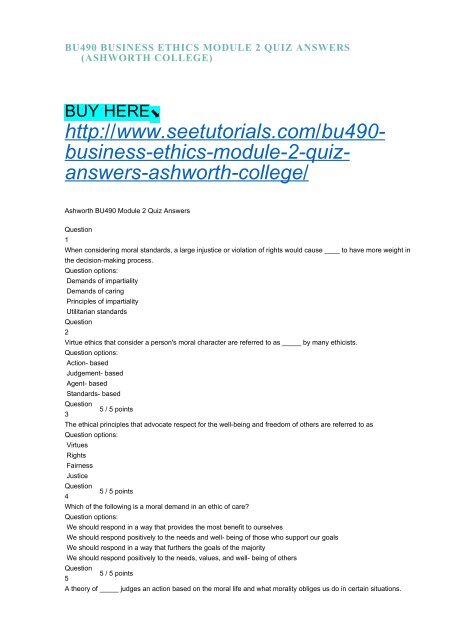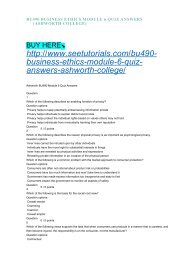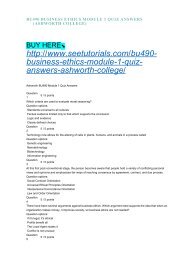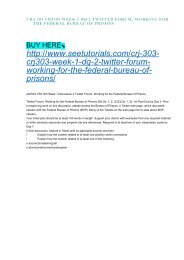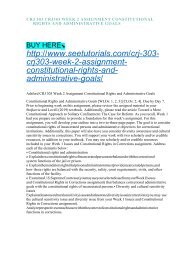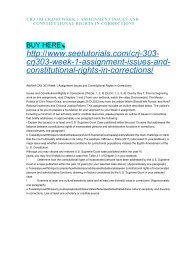BU490 BUSINESS ETHICS MODULE 2 QUIZ ANSWERS (ASHWORTH COLLEGE)
Create successful ePaper yourself
Turn your PDF publications into a flip-book with our unique Google optimized e-Paper software.
<strong>BU490</strong> <strong>BUSINESS</strong> <strong>ETHICS</strong> <strong>MODULE</strong> 2 <strong>QUIZ</strong> <strong>ANSWERS</strong><br />
(<strong>ASHWORTH</strong> <strong>COLLEGE</strong>)<br />
BUY HERE⬊<br />
http://www.seetutorials.com/bu490-<br />
business-ethics-module-2-quizanswers-ashworth-college/<br />
Ashworth <strong>BU490</strong> Module 2 Quiz Answers<br />
Question<br />
1<br />
When considering moral standards, a large injustice or violation of rights would cause ____ to have more weight in<br />
the decision-making process.<br />
Question options:<br />
Demands of impartiality<br />
Demands of caring<br />
Principles of impartiality<br />
Utilitarian standards<br />
Question<br />
2<br />
Virtue ethics that consider a person's moral character are referred to as _____ by many ethicists.<br />
Question options:<br />
Action- based<br />
Judgement- based<br />
Agent- based<br />
Standards- based<br />
Question<br />
5 / 5 points<br />
3<br />
The ethical principles that advocate respect for the well-being and freedom of others are referred to as<br />
Question options:<br />
Virtues<br />
Rights<br />
Fairness<br />
Justice<br />
Question<br />
5 / 5 points<br />
4<br />
Which of the following is a moral demand in an ethic of care?<br />
Question options:<br />
We should respond in a way that provides the most benefit to ourselves<br />
We should respond positively to the needs and well- being of those who support our goals<br />
We should respond in a way that furthers the goals of the majority<br />
We should respond positively to the needs, values, and well- being of others<br />
Question<br />
5 / 5 points<br />
5<br />
A theory of _____ judges an action based on the moral life and what morality obliges us do in certain situations.
Question options:<br />
An ethic of virtues<br />
An ethic of principles<br />
Moral principles<br />
Moral justice<br />
Question<br />
6<br />
Which of the following types of moral decision-making relies on past situations where there was a clear ethical<br />
response based on sound ethical reasoning?<br />
Question options:<br />
Cultural<br />
Casuistry<br />
Intention<br />
X- system<br />
Question<br />
5 / 5 points<br />
7<br />
Which of the following best describes the utility of a course of action by a business?<br />
Question options:<br />
The most objective benefits of an action<br />
The level of acceptability of an action by society<br />
The amount of compromise needed to produce an action<br />
The combination of benefits and costs of an action<br />
Question<br />
5 / 5 points<br />
8<br />
The idea that benefits should be distributed based on the value of contribution is a principle of which concept?<br />
Question options:<br />
Socialism<br />
Work ethic<br />
Egalitarianism<br />
Justice<br />
Question<br />
9<br />
Generally speaking, which ethical guidelines have greater weight in the decision-making process?<br />
Question options:<br />
Moral rights<br />
Utilitarian standards<br />
Standards of justice<br />
Individual rights<br />
Question<br />
5 / 5 points<br />
10<br />
An ethic based on the fundamental value that relationships should be preserved and maintained is a _____ ethic.<br />
Question options:<br />
Socialist<br />
Retributive<br />
Compensatory<br />
Communitarian<br />
Question<br />
5 / 5 points<br />
11<br />
What does rule utilitarianism look at?<br />
Question options:<br />
The amount of utility produced by a particular action<br />
The moral rules of a particular action<br />
The people affected by a particular action
The legality and legal rules of a particular action<br />
Question<br />
12<br />
Which of the following is NOT true regarding moral rights?<br />
Question options:<br />
They are closely related to duties<br />
They provide a basis for justifying one's actions<br />
They generally override utilitarian standards<br />
They are immune from all utilitarian considerations<br />
Question<br />
13<br />
Which of the following describes the duties others have to not interfere in certain activities of another person who is<br />
exercising a given right?<br />
Question options:<br />
Contractual rights<br />
Obligations<br />
Negative rights<br />
Duties<br />
Question<br />
14<br />
Which of the following is considered to be a primary benefit of utilitarianism?<br />
Question options:<br />
It advocates policies that create the biggest financial reward<br />
It produces the greatest benefits for society at a reasonable cost<br />
It allows governments to clearly define what is ethically right or wrong<br />
It impartially considers everyone's interests<br />
Question<br />
5 / 5 points<br />
15<br />
What does the libertarian philosophy espouse?<br />
Question options:<br />
Human beings have the right to an orderly but liberal society<br />
That human beings intrinsically crave liberty and cannot abide by rules<br />
That freedom from human constraint is necessarily good<br />
That all human constraints are evil<br />
Question<br />
5 / 5 points<br />
16<br />
The majority of moral decisions are made without thinking through the consequences; these decisions are made<br />
through the _____ processes.<br />
Question options:<br />
Conscious<br />
Ethical reasoning<br />
Unconscious<br />
Logical reasoning<br />
Question<br />
5 / 5 points<br />
17<br />
Many business analysts feel the best way to evaluate the ethics of a business decision is to analyze social costs and<br />
compare them to<br />
Question options:<br />
Those affected by the decision<br />
The cost of consequences<br />
Social benefits<br />
The greatest net benefits<br />
Question 5 / 5 points
18<br />
Which of the following statements support the views of egalitarians in terms of equality?<br />
Question options:<br />
All humans are equal and goods should be allocated in equal portions<br />
There are differences among people that justify unequal treatment<br />
If all cannot be served equally, those who are first, or senior, should be served first<br />
Goods should be allocated based on need, ability, and effort<br />
Question<br />
5 / 5 points<br />
19<br />
Immanuel Kant's principle, called the categorical imperative, requires that everyone be treated as:<br />
Question options:<br />
Free and equal person<br />
A dependent employee<br />
An indentured person<br />
A non- resident employee<br />
Question<br />
5 / 5 points<br />
20<br />
Which of the following is based on the moral norms and principles that say all human beings are empowered to do<br />
something or have something done for them?<br />
Question options:<br />
Human rights<br />
Legal rights<br />
Constitutional rights<br />
Jurisdictional rights


